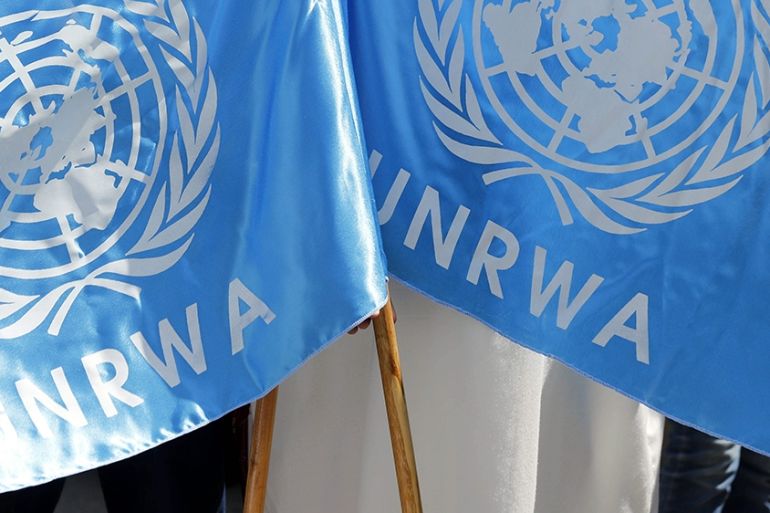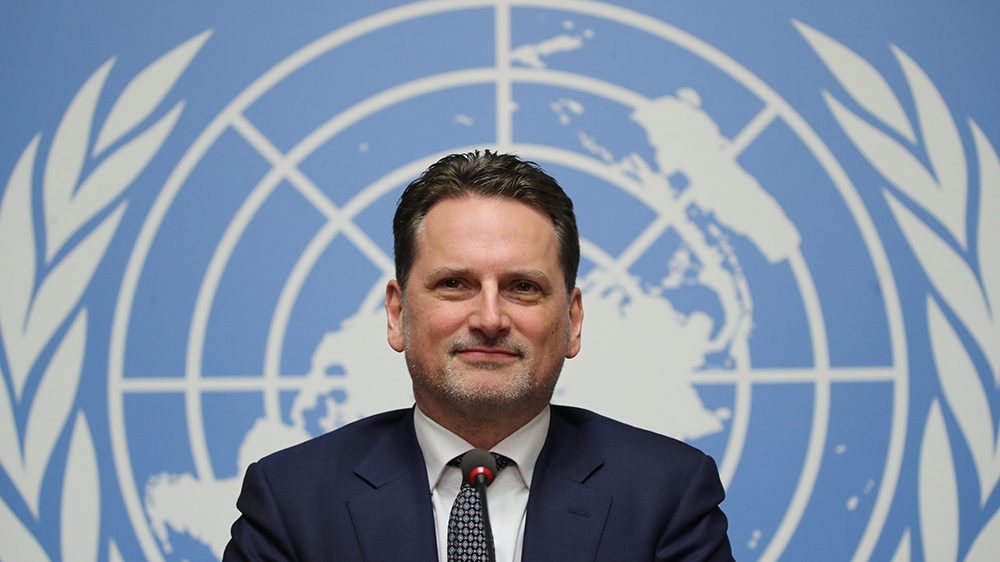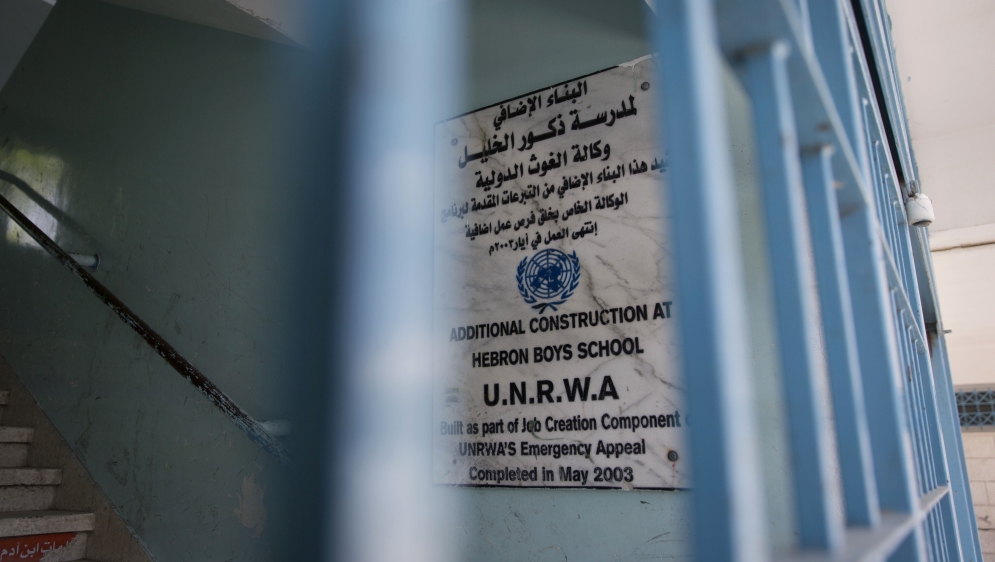Ethics report accuses UNRWA leadership of abuse of power
UNRWA chief Pierre Krahenbuhl rejects characterisation of senior team as UN investigates.

New York City, US – A confidential internal report from the UN’s Palestinian refugee agency’s ethics office has detailed alleged abuses of authority among the organisation’s senior management team.
With input from dozens of current and former staff, the 10-page document cites “credible and corroborated reports” that members of an “inner circle” at the top of UNRWA have engaged in “abuses of authority for personal gain, to suppress legitimate dissent and to otherwise achieve their personal objectives”.
Keep reading
list of 4 itemsIran claims ‘right to self-defence’ in Israel attack
US: Iran ‘will be held responsible’ for further attacks
UN Security Council meets after Iran launches attack on Israel
The report alleges that the “inner circle” is made up of Commissioner-General Pierre Krahenbuhl, Deputy Commissioner-General Sandra Mitchell – who resigned from her post in late July – Chief of Staff Hakam Shahwan – who left the agency in early July – and Senior Adviser to the Commissioner-General Maria Mohammedi.
It concludes that the individuals’ alleged conduct presents “an enormous risk to the reputation of the UN” and that “their immediate removal should be carefully considered”.
Al Jazeera obtained a copy of the ethics office report from a source close to UNRWA, who said that agency employees were concerned about a seeming lack of action after it was sent to UN Secretary-General Antonio Guterres‘s office in December last year.
Al Jazeera understands that the UN Office of Internal Oversight Services (OIOS) has opened a probe into allegations detailed in the report, while the secretary-general’s spokesman, Stephane Dujarric, confirmed in late June that the report had been received.
“An investigation of the allegations contained in the report you mention is ongoing. Until this investigation is completed, the Secretary-General is not in a position to make any further comments on this matter,” he said in a statement.
“As he has shown in the past, the Secretary-General is committed to acting swiftly upon receiving the full report.”
‘Concentration of power’
The ethics report claims that members of the inner circle “have engaged in misconduct, nepotism, retaliation … and other abuses of authority”.
It alleges that, since 2015, they have steadily consolidated power, leading to “management decline”, and that the situation escalated markedly from the beginning of 2018.
The alleged escalation coincided with the fallout from the decision by the United States, historically the agency’s largest individual donor, to cut its contributions from $360m to $60m for 2018 and then cut its donations to zero in 2019, causing a funding crisis in UNRWA.
The report claims that the 2018 crisis “served as an excuse for an extreme concentration of decision making power in members of the ‘clique’ and in particular, the [former] chief of staff; increased disregard for agency rules and established procedures, with exceptionalism becoming the norm; and continued excessive travel of the commissioner-general”.

It further alleges that these developments led to an “exodus of senior and other staff” and a work culture “characterised by low morale, fear of retaliation … distrust, secrecy, bullying, intimidation, and marginalisation … and management that is highly dysfunctional, with a significant breakdown of the regular accountability structure”.
When presented with a number of the allegations reported in this story, Krahenbuhl “unreservedly” rejected the characterisation of UNRWA and its senior leadership set out in the extracts.
“If the current investigation – once it is completed – were to present findings that require corrective measures or other management actions, I will not and we will not hesitate to take them,” he said in a statement to Al Jazeera.
“Any suggestion therefore that we are not taking our responsibilities seriously is unfounded and highly misleading. We should be judged on the findings of the independent investigation not on allegations, rumors or fabrications,” he said.
‘Beyond the professional’
Much of the report focuses on allegations surrounding the conduct of Commissioner-General Krahenbuhl, 53, who took up the post in March 2014.
It says that in the second half of the same year, the Swiss national made several trips to the Gulf region, accompanied by staff from UNRWA’s Arab Partners Unit, including Mohammedi, who was a Senior External Relations Projects Officer at the time.
The report cites unnamed sources as saying that Krahenbuhl “expressed a particular interest” in Mohammedi in late 2014.
Mohammedi was subsequently appointed to the role of senior adviser to the commissioner-general, effective February 2015.
|
|
The report says that after the appointment, it quickly became clear to staff in UNRWA’s Executive Office and the External Relations and Communications Department (ERCD) that their relationship went “beyond the professional”.
The relationship between the two created a “toxic environment” for colleagues in the executive office and caused “frequent embarrassment for ERCD colleagues and others when dealing with member states”, including donor representatives and donors, the report alleges.
It claims that, following her appointment, Krahenbuhl took Mohammedi with him on “the vast majority of his business travels, using his authority to obtain waivers enabling her to travel business class with him”.
Citing former executive office staff, it alleges that the commissioner-general was “structurally away from his duty station of Jerusalem on duty travel … claiming DSA (daily subsistence allowance) for 28-29 days per month”.
In a statement to Al Jazeera, Krahenbuhl said: “UNRWA is aware that a report was submitted to the United Nations Headquarters, which is said to contain allegations against members of UNRWA’s staff.”
“At the end of March 2019, I was notified that allegations against UNRWA would be investigated by the Office of Internal Oversight Services (OIOS). I have at all stages of this process instructed and afforded full cooperation with this investigation.
“While the investigation is underway, I am not at liberty – and neither for that matter is any UNRWA staff member – to comment on specific allegations or on rumours. Interfering with or otherwise commenting on specific elements of an investigation may violate rules and obligations we are bound by as UN staff,” he said.
Mohammedi told Al Jazeera she had “never seen” the ethics report and rejected the accusations about her conduct as “false” and “ill-intentioned”.
A former UNRWA director, who spoke on the condition of anonymity, told Al Jazeera they had read the ethics report and found it to be “accurate”.

Funding crisis
After the US announced in January 2018 it would reduce its funding to UNRWA, Krahenbuhl launched the “Dignity is Priceless” global fundraising campaign, which aimed to raise $500m.
It was established outside of the ERCD, which traditionally manages fundraising efforts, causing “considerable friction” with the department and “contributing to the departure of several senior ERCD staff”, the report claims.
“In spite of its target, the campaign reportedly raised only modest amounts, with the vast majority of the agency’s new funding raised through ERCD, with the commissioner-general’s and a number of key member states’ active support,” the report alleges.
Krahenbuhl told Al Jazeera that the 2018 Dignity is Priceless Campaign was “one of the most successful resource mobilization efforts of all times”.
“By the end of the year, this campaign enabled us to successfully close the entire shortfall of $446m, an outstanding result”, he said in a statement.
‘Irregular recruitment’
According to the report, Deputy Commissioner-General Sandra Mitchell and former Chief of Staff Hakam Shahwan had previously worked together closely over several years.
The ethics report alleges two reported attempts in 2018 by Mitchell, through Shahwan and other staff, to secure a more senior appointment for her spouse, Robert Langridge.
Mitchell’s spouse was appointed as a deputy director at UNRWA’s Jordan field office, effective October 2018.
The report alleges that Langridge “was appointed through an irregular recruitment process and in violation of the UN and Agency prohibition of conflicted spousal appointment”.
In a statement to Al Jazeera, Langridge said he categorically rejected the allegations.
“I particularly resent and reject the notion that I was not qualified for the position. This is neither factual nor correct,” he said.
Mitchell told Al Jazeera she “emphatically” rejected all the allegations.
“There is a pending investigation and as a UN staff member, I am restricted from commenting on specific allegations nor do I wish to interfere in that process as this would violate rules and obligations that I am bound by as a UN staff member”, she said in a statement.
UNRWA told Al Jazeera Mitchell decided to step down a few months earlier than scheduled for personal reasons, but as of now, she is still a staff member of the agency.
Pseudonymous email
Shahwan was described by many staff members as behaving like a “thug” and as being increasingly seen as the de facto leader of UNRWA, the report alleges.
It also describes allegations that the former chief of staff undercut the work of field directors and had “effectively taken over UNRWA operations in Jerusalem”, circumventing field office chains of command and “bypassing established procurement and financial processes and decision making”.
The report also alleges that after an UNRWA driver made a complaint against co-workers, including Shahwan, in 2018, the chief of staff reacted by “defaming” the complainant and “using his influence to have the driver placed on administrative leave”.
In early July, Shahwan left UNRWA after a pseudonymous email was sent to Al Jazeera, attempting to discredit the alleged author of the ethics report.
When Al Jazeera subsequently contacted the agency about the email, it said that Shahwan had left the agency as a “direct response”.
“UNRWA confirms that after receiving a copy of an anonymous email sent to you [Al Jazeera] addressing the alleged author of the report and related matters, the Agency undertook an immediate review and subsequently, one of its senior staff members was separated as a direct response to that breach,” UNRWA spokesperson Tamara Alrifai said in statement to Al Jazeera, confirming later that the senior staff member was Shahwan.
“Such an email is totally unacceptable,” she added.
In a statement posted on social media in early July, Shahwan said he had “decided to resign” from UNRWA.
When contacted by Al Jazeera, he did not comment on specific allegations about his conduct but said his “resignation has no link whatsoever to any of the allegations in the report”.
‘Satisfactory results’
Established by the United Nations in 1949, UNRWA was originally intended to provide jobs and relief to Palestinian refugees who fled or were forcibly displaced during the 1948 Middle East war, which led to the creation of Israel. Its mandate is renewed every few years in the UN General Assembly.
The agency, which is mostly funded by donations from UN member states, currently provides services, including education, healthcare, relief and social aid to more than five million Palestinian refugees across the Middle East.
UNRWA’s mandate is due to come up for renewal later this year in the UN General Assembly, where it traditionally receives strong support, but the agency has faced a number of attacks from the US in recent months.
Krahenbuhl told Al Jazeera that recent external and UN reports showed “positive assessments” of UNRWA’s management.
“A recent report by an external group of experts (MOPAN) has just shown satisfactory (and at times very satisfactory) results of UNRWA’s management and impact – which is particularly important for us during these times of intense political and financial pressure on the agency,” he said in a statement.
“Similarly, the United Nations Board of Auditors recognized the quality of the management and leadership of UNRWA. Finally, the 2018 annual report recently presented by UNRWA’s Department of Internal Oversight Services and Ethics Division – both independent bodies – to UNRWA’s Advisory Commission (host countries and largest donors) confirmed these positive assessments. These reports testify to the strength of this Agency and are a matter of public record.”